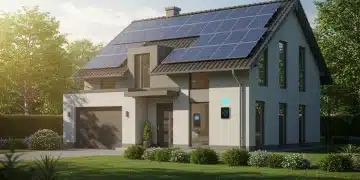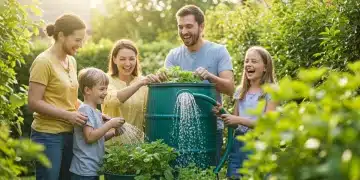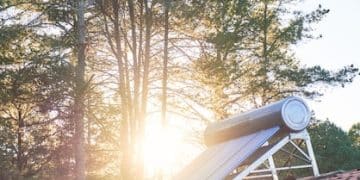Water Conservation Tips: Save Water and Reduce Bills by 25%

Water conservation tips can significantly reduce your water bill by up to 25% through simple changes in daily habits, efficient appliances, and smart landscaping choices, benefiting both your wallet and the environment.
Are you looking for effective water conservation tips that can reduce your water bill by up to 25%? Conserving water not only saves you money but also helps protect our planet’s precious resources. Let’s dive into practical strategies you can implement today!
Simple Indoor Water Conservation Techniques
Conserving water inside your home is one of the easiest ways to lower your water bill. Many of these techniques require minimal effort but can make a significant difference over time. Focusing on daily habits and efficient appliances is key.
Fix Leaks Promptly
Even small leaks can waste a considerable amount of water over time. Addressing leaks as soon as you notice them is crucial for effective water conservation.

Install Low-Flow Showerheads and Faucets
Upgrading to low-flow fixtures can significantly reduce water usage without sacrificing water pressure. These fixtures are designed to use less water while still providing a satisfying experience.
- Use a leak detection app to identify hidden leaks.
- Regularly check faucets and pipes for drips or signs of moisture.
- Replace worn-out washers and O-rings to prevent leaks.
- Consider hiring a professional plumber for complex leak repairs.
By promptly fixing leaks and installing low-flow fixtures, you can dramatically reduce indoor water consumption and lower your monthly water bills.
Efficient Bathroom Water-Saving Methods
The bathroom is one of the biggest water consumers in the average household. By adopting more efficient water-saving methods in this area, you can significantly reduce your overall water usage and costs.
Take Shorter Showers
Reducing the length of your showers can save a substantial amount of water. Even cutting a few minutes off each shower can add up to significant savings over time.
Don’t Let the Water Run While Brushing Teeth
Turning off the faucet while brushing your teeth is a simple habit that can save gallons of water each day. This small change requires minimal effort but yields significant conservation benefits.

- Set a timer to keep showers under 5 minutes.
- Install a low-flow showerhead to reduce water usage.
- Collect water while waiting for it to heat up and use it for plants.
- Consider a shower timer or water monitor to track your usage.
By implementing these efficient bathroom water-saving methods, you can significantly reduce your water consumption and contribute to both environmental conservation and lower utility bills.
Optimize Your Laundry and Dishwashing Practices
Laundry and dishwashing are essential household tasks that can consume a lot of water if not done efficiently. Optimizing these practices can lead to significant water savings and reduced costs.
Run Full Loads
Always ensure you are running full loads when using your washing machine and dishwasher. This maximizes the efficiency of each cycle and reduces the number of loads you need to run.
Use Efficient Appliances
Opting for energy-efficient and water-saving appliances can make a substantial difference in your water consumption. Look for models with high WaterSense ratings.
- Choose washing machines with a high Modified Energy Factor (MEF).
- Select dishwashers with sensors that adjust water usage based on load size.
- Use the economy or eco-mode settings on your appliances.
- Regularly maintain your appliances to ensure optimal performance.
By optimizing your laundry and dishwashing practices, you can minimize water waste and lower your water bills, contributing to both environmental sustainability and cost savings.
Outdoor Water Conservation Strategies
Outdoor water usage often accounts for a significant portion of household water consumption, particularly during warmer months. Implementing effective outdoor water conservation strategies is essential for reducing your water bill.
Efficient Irrigation Systems
Using efficient irrigation systems can significantly reduce water waste in your garden. Consider options like drip irrigation or soaker hoses that deliver water directly to plant roots.
Water Wisely
Watering your lawn and garden wisely means timing your watering sessions to minimize evaporation and avoiding overwatering. This approach ensures your plants get the water they need without wasting resources.
- Water early in the morning or late in the evening to reduce evaporation.
- Use a rain barrel to collect rainwater for irrigation.
- Adjust your watering schedule based on weather conditions.
- Consider xeriscaping, which uses drought-tolerant plants.
By employing these outdoor water conservation strategies, you can substantially reduce your water consumption and lower your utility bills while maintaining a healthy and vibrant garden.
Landscaping Ideas for Water Conservation
Choosing the right landscaping can have a major impact on your water usage. By selecting drought-tolerant plants and employing water-saving landscaping techniques, you can create a beautiful outdoor space while conserving water.
Choose Native Plants
Native plants are well-adapted to the local climate and require less water and maintenance than non-native species. They also support local ecosystems and biodiversity.
Xeriscaping
Xeriscaping is a landscaping method that utilizes drought-tolerant plants, gravel, and mulch to minimize water usage. This approach can create a visually appealing and sustainable landscape.
- Select plants with low water requirements.
- Use mulch to retain soil moisture and suppress weeds.
- Group plants with similar water needs together.
- Consider permeable pavements to reduce runoff.
By implementing these landscaping ideas for water conservation, you can create an attractive and sustainable outdoor environment while significantly reducing your water bill and supporting environmental conservation.
Monitor Your Water Usage
Effectively managing your water consumption requires regular monitoring and tracking. By understanding how much water you use and identifying areas of high usage, you can make informed decisions to conserve water and lower your bills.
Read Your Water Meter
Regularly reading your water meter can help you track your water consumption and identify any potential leaks. Monitoring your meter provides valuable insights into your water usage patterns.
Use Water Monitoring Devices and Apps
There are various water monitoring devices and apps available that can help you track your water consumption in real-time. These tools provide detailed information about your usage patterns and can alert you to potential issues.
- Install a smart water meter to track usage remotely.
- Use a water usage app to monitor consumption on your smartphone.
- Set up alerts for high water usage or potential leaks.
- Analyze your water usage data to identify areas for improvement.
By consistently monitoring your water usage, you can gain valuable insights into your consumption patterns, identify areas for improvement, and make informed decisions to conserve water and reduce your monthly expenses. You will also reduce your water conservation tips.
| Key Point | Brief Description |
|---|---|
| 💧 Fix Leaks | Repairing leaks promptly prevents water waste. |
| 🚿 Shorter Showers | Reducing shower time saves a significant amount of water. |
| 🧺 Full Loads | Washing full loads of laundry maximizes efficiency. |
| 🌱 Native Plants | Using native plants reduces watering needs. |
FAQ – Water Conservation
▼
To check for leaks, examine faucets, toilets, and pipes for drips. Monitor your water meter for unusual changes and consider using leak detection tools or hiring a plumber for thorough inspections.
▼
Low-flow showerheads reduce water usage while maintaining adequate water pressure. They help lower water bills, conserve water resources, and are easy to install in most showers.
▼
Water your lawn deeply but infrequently, typically about once or twice a week. Water early in the morning to reduce evaporation and adjust based on weather conditions and rainfall.
▼
Xeriscaping is a landscaping method that uses drought-tolerant plants, mulch, and efficient irrigation techniques to minimize water usage. It can reduce watering needs by up to 60%.
▼
Yes, collecting rainwater is a great way to conserve water. Use rain barrels to capture rainwater from your roof and use it to water your garden, plants, and lawn, reducing your reliance on tap water.
Conclusion
Implementing these water conservation tips can lead to substantial savings on your water bill and contribute to a more sustainable lifestyle. By making small changes to your daily habits and investing in water-efficient appliances, you can significantly reduce your water consumption and help protect our planet’s precious resources.





